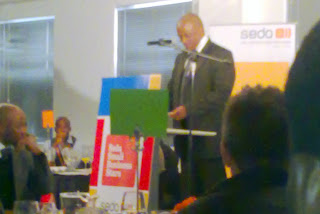KEEP YOUR "BEE"- I don’t need it!
The Raizcorp ‘Pitch and Polish’ event held in Vereeniging: A resounding success!, it is a revolutionary workshop and competition specifically centred on growth entrepreneurship.
Hailing from the Vaal is the emerging young, black, talented entrepreneur Fanelo Peter Maseko who proves my point that indeed Black people are making things happen unapologetically. He is the second runner up of last year's Pitch and Polish competition.
I attended this event for the second time now and I have realised how much things have changed for the
better in South Africa. Black people are taking charge of their destinies as the landscape of contestants and even those in the audience was predominantly black.
Considering that the black community historically comes from harsh economic repression that advertently made black people inferior in the economy and subordinate to their white counterparts. Post 1994 - blacks adopted an obsessive sense of entitlement for handouts by the government, but this is indeed beginning to change, judging from the breed of entrepreneurs I engaged with who attended the event. The internal locus of control demonstrated by these fellow entrepreneurs was amazing.
There seems to be a change in mindset as black people are no longer waiting on the government but are taking charge of their own lives and this of course is catalysed by companies like Raizcorp who have committed themselves to instilling a culture of entrepreneurship among South Africans.
It is always a pleasure being in the presence of entrepreneurs because their thinking is generally skewed towards ‘possibility and risk’ and not towards ‘impossibility and security’.
The contestants had lucrative ideas and the most fundamental theme for me was the realisation that the market orientation of business people has shifted to another level as black entrepreneurs have become more experimental and innovative. What I also observed is that South African entrepreneurs are starting to venture into technology. We heard of very fascinating ideas that all had unique facets of technological ingenuity.
One of those in the panel of contestants is an experienced metallurgical engineer who has found a lucrative way of recycling an industrial by-product into a substitute which will be of paramount significance in the construction industry.
Innovative entrepreneurship is the name of the game and the black community is making their mark, the days of BEE and cronyism are fast growing to an end, simply judging from what I grasped from the contestants and the 300strong audience attending that event.
The facilitator of the workshop is no longer Allon Raiz as was the case last year, it is Eugene who happens to have much in common with Allon Raiz (the main entrepreneur behind Raizcorp). This struck me because it stood in agreement with Allon’s personal philosophy that growth entrepreneurs create systems that help their companies remain lucrative investments even when they are gone, as systems provide reasonable assurance that though they (the entrepreneurs/founders) may be gone but expectations are still met by results and performance will not be compromised.
I attended the workshop expecting him to be the facilitator again but was surprised to find an equally effective individual holding the ties. I observed how systematic the presentation of the workshop was as it didn’t deviate much from the initial workshop.
This idea of creating systems is what has held companies like Microsoft in good stead against their competitors because they’ve remained consistent. They build on what they already have and they don’t randomly change their formulas. Microsoft is comparable with with Raizcorp who, judging from the workshop, have made some improvements yet still delivered as expected this still maintaining their identity. In other words I didn’t see a different Raizcorp but an improved one.
My personal favourite highlight was the 5P’s of marketing; Place, Product, Promotion, Price and PRAYER.
And yes! we all received a free copy of Allon Raiz’s most recent bestseller: ‘What To Do When You Want To Give Up’ available at all leading bookstores.
Follow Allon Raiz on http://www.twitter.com/allonraiz
I was on page 60 in less than 3hours and I am not a heavy reader – it is packed full of surprises!








